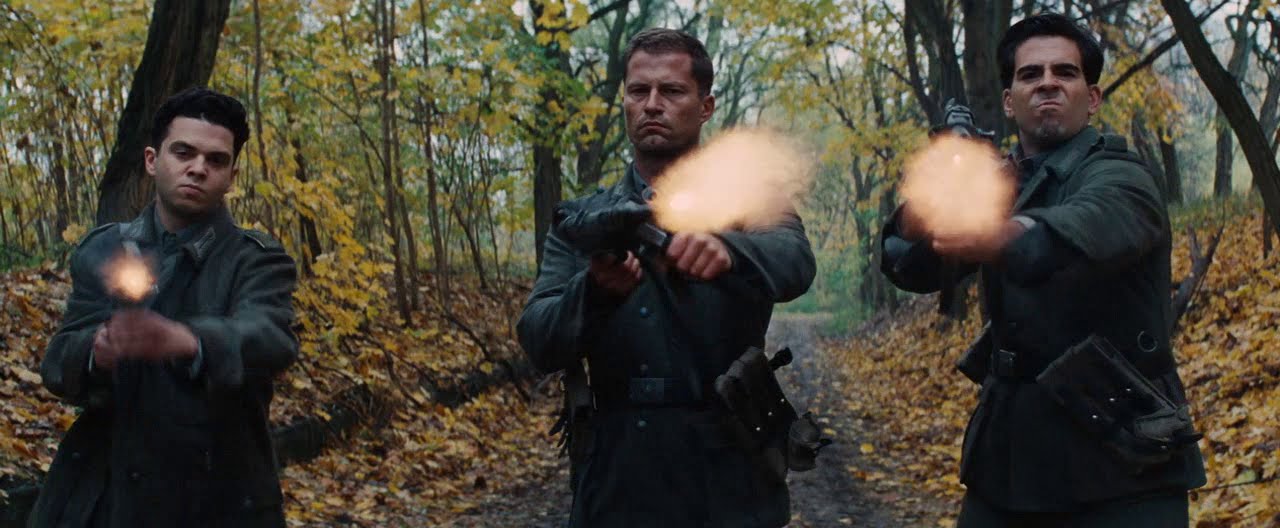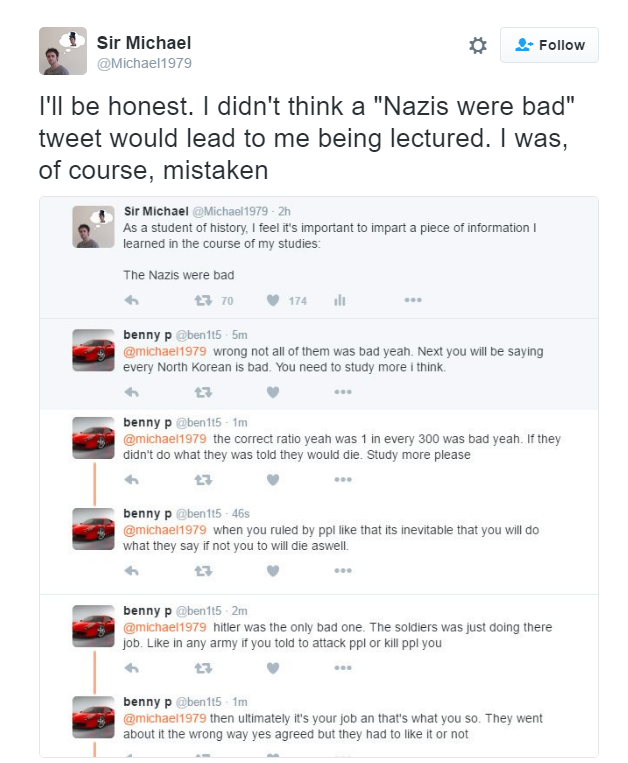“This whole Nazi resurgence is because we stopped shooting them in video games after Call of Duty 4, isn’t it?”
I tweeted the above this week in response to the horrifying video of Richard B Spencer leading the alt right in a Nazi salute to President Elect Donald Trump. It was a joke. You have to be able to make light of the insanity America is currently facing, or you’ll crack completely.
But the more I thought about this, the more I thought that there was a seed of truth behind it. One of the ways that lessons and values are taught to children is through storytelling. We read Dr. Seuss to our kids because his stories impart wisdom about issues like conformity, or environmentalism, or even nuclear weaponry. It’s present in religion, as well. What is a holy book like the Torah, or the Bible, or the Quran, if not a series of stories meant to impress a system of values upon its followers?
As adults, and outside of religion, we like to consider ourselves unaffected by the influence of narrative moralizing. We’re above that, we think. We can determine right from wrong, and nobody changes their mind because of a singular work of art. And in many cases, that’s true; you could probably count on both hands the number of people who were “converted” by a Michael Moore or Dinesh D’Souza movie.
But what we sometimes lose sight of is the way that the narrative landscape can influence and reinforce values as a whole. Our stories often shape how we define the “heroes” and “villains” of past conflicts, and nowhere is this delineation more clear than with the depiction of World War II. It’s the most cut and dried of wars, where one side was defending the world from widespread racial and religious extermination.
For decades following the war, during the confusing period of the Cold War and the even more complicated reality of post-9/11 America, Nazis remained a go-to villain in pop culture. They were who Indiana Jones fought to save the world. They were a foil for Bugs Bunny in Looney Tunes cartoons. They were, along with zombies, one of the only humanoid things you could shoot in a video game without anybody batting an eye. Hell, you could even get away with a T (13+) rating.
The point is, after very nearly succumbing to a world ruled by hateful, genocidal monsters, the entertainment world rallied to make Nazis a universal shorthand for evil. It’s only natural, as a more cartoonishly, blatantly evil adversary has never existed. Few dared sympathize with Nazi ideology because doing so was deemed completely unacceptable. Despite being an actual person who lived and died, Adolf Hitler joined the ranks of Satan and Darth Vader as unimpeachably evil cultural figures.
But after 9/11, our system of values became far more complicated. We were no longer attacking countries, but fighting back against ideologies. As our own understanding of good and bad became muddier, the Nazis fell out of favor as go-to bad guys. They still represented cartoon villainy, and we, all grown up, craved villains that engaged us intellectually.
This sort of moral complexity is usually good. By not boxing each other in by broad group identities, it allows us to approach situations from outside perspectives and generally be more empathetic. However, it also leaves room for rationalizing previously unthinkable ideologies. If nothing, not even the extermination of entire races or religious groups, is off the table, then it is possible for people to let their systems of values lead them to some truly dark places. This Twitter exchange, shared by @Michael1979, really cuts to the heart of the matter:
The general, obvious statement “The Nazis were bad” is no longer a shared, assumed perspective, but one that has to be broken down and reconsidered. If you’re sensing a defensive tone in those replies, you’re not alone, either. I think it’s entirely possible that many people who aligned themselves with the “alt right” are starting to see through the facade, and they don’t want to see themselves as bad people. They just got caught up in a really hateful, powerful movement.
But the Nazis @ben1t5 is defending above were embroiled in a conflict that didn’t start overnight. Those same people sat by and watched as an outwardly hateful movement took control of their country. They weren’t always in a position where they could either support genocide or die; they sat by and let that become the agenda of their nation. There were warning signs there, just as there are here.
And that’s the one upside to where we are right now: the people who voted for Donald Trump can still do something about it. We can stand firm together and make it clear that this “alt right” isn’t just a bunch of stylish young go-getters, but an actual manifestation of Nazi values that we spent half a century de-legitimizing. We can inform people that this isn’t just a goofy fringe movement, or a handful of radicals, but a serious threat to this country that, through Donald Trump, has made its way to the White House.
But we’ll have an easier time doing that if we all accept that Nazis, along with their ideologies, are evil. So let’s take some time and enjoy some anti-Nazi entertainment. Watch Inglourious Basterds, or play Wolfenstein, or rewatch Raiders of the Lost Ark for the hundredth time. Remind yourself that there is no meeting these people halfway, and let the world know.

